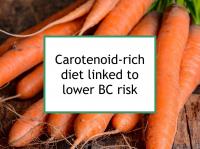Women with substantial intake of dietary carotenoids appear to have lower risks of breast cancer and breast cancer recurrence than women with low intake, although the evidence is inconsistent. Now a new study has reported that carotenoid-rich diets are associated with a variety of metabolic changes which may help inhibit breast cancer.
Carotenoids and breast cancer
As noted above, women with substantial intake of carotenoids have been reported to have lower risks of breast cancer and its recurrence. Higher levels of carotenoids and vitamin A (retinol) in the blood of breast cancer survivors both have been found to be associated with greater likelihood of breast cancer-free survival. In addition to the general finding that carotenoid intake is linked to reduced breast cancer risk and progression, researchers have uncovered chemopreventive effects of carotenoids under specific circumstances that apply only to a minority of women.
A Scandinavian study found that dietary (but not supplemental) beta-carotene had a protective effect against lobular breast cancer in postmenopausal women. Another European study reported that high intake of beta-carotene was protective against breast cancer in postmenopausal women using hormone replacement therapy (HRT). The same study also found that dietary beta-carotene was associated with lowered risk of breast cancer in postmenopausal women with relatively high alcohol consumption. Consuming foods high in carotenoids has also been shown to reduce the risk of breast cancer among women with high breast density, although not all studies are in agreement.
Beta-carotene has been reported to enhance the cytotoxicity of doxorubicin in both hormone receptor positive (ER+/PR+) and triple negative (ER-/PR-/HER2-) breast cancer cells.
Beta-carotene has also been demonstrated to reduce multidrug resistance (MDR) in cancer cells. MDR proteins are present in a majority of human tumors and are an important cause of eventual treatment failure. One study that investigated the effects of carotenoids on the activity of the MDR-1 gene reported that the carotenoids lycopene and zeaxanthin both induced apoptosis (programmed cell death) in triple negative breast cancer cells made resistant to chemotherapy through MDR-1.
Recommended food sources of carotenoids
Below are very good food sources of carotenoids that have also been reported to be associated with reduced risk of breast cancer:
Carotenoid supplements are not recommended
Studies of the effects of carotenoid supplements have produced inconsistent results, often reporting either no effects or adverse effects on breast cancer risk and prognosis. For example, a study that included women with early stage breast cancer in the Kaiser Permanente Northern California Cancer Registry reported that frequent use of combination multiple carotenoid supplements was associated with double the risk of death from breast cancer compared to no such use. The same study found no such relationship for beta-carotene or lycopene alone. The women were enrolled in the study approximately two years after diagnosis.
However, note that lycopene supplements should be avoided as an increased risk of breast cancer has also been reported to be associated specifically with this supplement. Carotenoids are bioavailable from foods. It makes sense to increase carotenoid intake through diet.
Latest research links carotenoid intake to lower BC risk
The study referenced above was designed to investigate the underlying biological mechanism behind previous reports that women with higher circulating carotenoids have a lower risk of breast cancer. To conduct the study, the authors first identified and evaluated 293 pre-diagnostic plasma metabolites in 887 participants in the Nurses' Health Studies. Plasma metabolites are intermediate or end products of metabolism which drive significant biological activities in the body. Metabolite profiling such as that performed in the current study involves the measurement of plasma metabolites that are associated with a variety of biological conditions and circumstances, in this case carotenoid intake and breast cancer.
The authors determined which metabolites were associated with circulating carotenoids and the metabolic signatures that were relevant to breast cancer risk. A total of 48 to110 metabolites were found to be associated with plasma levels of alpha-carotene, beta-carotene, beta-cryptoxanthin, estimated-vitamin-A-potential, lutein/zeaxanthin, and/or lycopene. These consisted of metabolites involved primarily in immune regulation and other relevant functions. The authors then determined which carotenoid signatures were associated with variations in breast cancer risk.
The results of the analysis demonstrated that women with the highest levels of circulating carotenoids (i.e., carotenoid-associated metabolites) had significantly lower risk of breast cancer than those with the lowest. For example, those in the highest quartile (fourth) of the metabolomic signatures of beta-carotene (as measured more than 10 years before diagnosis) had approximately 26% lower breast cancer risk compared to those in the lowest quartile. While some of the identified metabolites may reflect overlap with non-carotenoid rich foods (for example, due to shared common food sources), others are likely to point to underlying pathways of carotenoid-associated reductions in breast cancer risk. The authors conclude that consumption of a carotenoid-rich diet is associated with a wide variety of metabolic changes which may serve to reduce the risk of breast cancer.
Please click on our beta-carotene tag for more information.
